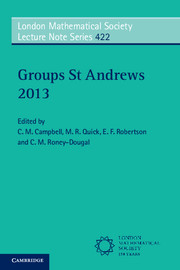Book contents
- Frontmatter
- Contents
- INTRODUCTION
- Approximate subgroups and super-strong approximation
- Width questions for finite simple groups
- Profinite properties of discrete groups
- GL(n, Z), Out(Fn) and everything in between: automorphism groups of RAAGs
- Permutation groups and transformation semigroups: results and problems
- New progress on factorized groups and subgroup permutability
- A survey on the normalizer problem for integral group rings
- A survey on Clifford-Fischer theory
- A generalisation on the solvability of finite groups with three class sizes for normal subgroups
- Automorphism groups of non-orientable Riemann surfaces
- What are the C2-groups?
- Resurrecting Wells’ exact sequence and Buckley's group action
- Recent work on Beauville surfaces, structures and groups
- Something for nothing: some consequences of the solution of the Tarski problems
- The groups of projectivities in finite planes
- On the relation gap and relation lifting problem
- Some results on products of finite subsets in groups
- Formal languages and group theory
- On the Castelnuovo-Mumford regularity of the cohomology of fusion systems and of the Hochschild cohomology of block algebras
- Recent advances on torsion subgroups of integral group rings
- On finite groups with small prime spectrum
- Solvability criteria for finite loops and groups
- The rational subset membership problem for groups: a survey
- A survey of Milnor laws
- Capable p-groups
- On the normal structure of a finite group with restrictions on the maximal subgroups
- Certain monomial characters and their normal constituents
- Recognition of finite quasi-simple groups by the degrees of their irreducible representations
- Generalized Baumslag-Solitar groups: a survey of recent progress
- Zeta functions of groups and rings – recent developments
Formal languages and group theory
Published online by Cambridge University Press: 05 September 2015
- Frontmatter
- Contents
- INTRODUCTION
- Approximate subgroups and super-strong approximation
- Width questions for finite simple groups
- Profinite properties of discrete groups
- GL(n, Z), Out(Fn) and everything in between: automorphism groups of RAAGs
- Permutation groups and transformation semigroups: results and problems
- New progress on factorized groups and subgroup permutability
- A survey on the normalizer problem for integral group rings
- A survey on Clifford-Fischer theory
- A generalisation on the solvability of finite groups with three class sizes for normal subgroups
- Automorphism groups of non-orientable Riemann surfaces
- What are the C2-groups?
- Resurrecting Wells’ exact sequence and Buckley's group action
- Recent work on Beauville surfaces, structures and groups
- Something for nothing: some consequences of the solution of the Tarski problems
- The groups of projectivities in finite planes
- On the relation gap and relation lifting problem
- Some results on products of finite subsets in groups
- Formal languages and group theory
- On the Castelnuovo-Mumford regularity of the cohomology of fusion systems and of the Hochschild cohomology of block algebras
- Recent advances on torsion subgroups of integral group rings
- On finite groups with small prime spectrum
- Solvability criteria for finite loops and groups
- The rational subset membership problem for groups: a survey
- A survey of Milnor laws
- Capable p-groups
- On the normal structure of a finite group with restrictions on the maximal subgroups
- Certain monomial characters and their normal constituents
- Recognition of finite quasi-simple groups by the degrees of their irreducible representations
- Generalized Baumslag-Solitar groups: a survey of recent progress
- Zeta functions of groups and rings – recent developments
Summary
Introduction
Our aim is to explore some connections between word problems of groups and formal language theory. One question is whether any finitely presented group has a recursive word problem, i.e., if there is an algorithm to decide if a given word in the generators of such a group represents the identity; this was shown not to be the case by Novikov and Boone independently [37, 6]. A finitely presented group has a recursively enumerable word problem however, i.e., there is a process listing the words representing the identity; the process will not terminate (there are infinitely many such words) but any word representing the identity will eventually appear.
We are interested in relating the complexity of the word problem (as a formal language) to the algebraic structure of the group. With regards to the classes of languages we have just mentioned, there is the beautiful Higman embedding theorem [16] which says that a finitely generated group has a recursively enumerable word problem if and only if it can be embedded in a finitely presented group. For recursive languages it was shown by Boone and Higman [7] that a finitely generated group has a recursive word problem if and only if it can be embedded in a simple group which can, in turn, be embedded in a finitely presented group. This was strengthened by Thompson [44] who showed that a finitely generated group has a recursive word problem if and only if it can be embedded in a finitely generated simple group which can, in turn, be embedded in a finitely presented group. There is a natural (and seemingly difficult) question (attributed to Higman) which asks if we can strengthen this further by proving that every finitely generated group with a recursive word problem can be embedded in a finitely presented simple group.
We will survey some work concerning groups whose word problem is a simpler type of language. We will concentrate on the class of context-free languages, some subclasses of the context-free languages and some other related classes (such as intersections and complements of context-free languages); there are many other interesting classes of languages we have not discussed such as the the class of real-time languages (see [18, 20, 23] for example) the class of growing context-sensitive languages (see [22, 29]) and the class of context-sensitive languages (see [31, 41]).
- Type
- Chapter
- Information
- Groups St Andrews 2013 , pp. 306 - 323Publisher: Cambridge University PressPrint publication year: 2015



